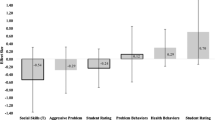Abstract
There is growing concern over the number of young children who display challenging behavior and preschool teachers are reporting children’s challenging behavior as their greatest concern. Program-wide Positive Behavior Support (PWPBS) is a promising model for supporting appropriate behavior and decreasing challenging behavior in early childhood programs. Implementation in early childhood settings is relatively new and guidance on how to implement PWPBS in early childhood settings is growing. This article documents the implementation process for an early childhood program serving children from 6 weeks to 5 years of age, shares lessons learned and offers practical advice for getting started with PWPBS.


Similar content being viewed by others
References
Alkon, A., Ramler, M., & MacLennan, K. (2003). Evaluation of mental health consultation in child care centers. Early Childhood Education Journal, 31, 91–99.
Benedict, E. A., Horner, R. H., & Squires, J. K. (2007). Assessment and implementation of positive behavior support in preschools. Topics in Early Childhood Special Education, 27(3), 174–192.
Campbell, S. B. (1995). Behavior problems in preschool children: A review of recent research. Journal of Child Psychology and Psychiatry and Allied Disciplines, 36, 113–149.
Carter, D. R., Steed, E. A., & Pomerleau, T. (2009). Preschool effective behavior support self-assessment survey. Boise, ID: Boise State University.
Coie, J. K., & Dodge, K. A. (1998). Aggression and antisocial behavior. In W. Damon & N. Eisenberg (Eds.), Handbook of child psychology, 5th edition. Volume 3. Social, emotional and personality development. NY: Wiley.
Dishion, T. J., French, D. C., & Patterson, G. R. (1995). The development and ecology of antisocial behavior. In D. Cicchetti & D. J. Cohen (Eds.), Developmental psychopathology, Vol. 2: Risk, disorder and adaptation (pp. 421–471). New York: Wiley.
Duda, M. A., Dunlap, G., Fox, L., Lentini, R., & Clarke, S. (2004). An experimental evaluation of positive behavior support in a community preschool program. Topics in Early Childhood Special Education, 24(3), 143–156.
Fox, L., Carta, J., Strain, P. S., Dunlap, G., & Hemmeter, M. L. (2010). Response to intervention and the pyramid model. Infants & Young Children, 23(1), 3–13.
Fox, L., Dunlap, G., Hemmeter, M. L., Joseph, G. E., & Strain, P. S. (2003). The teaching pyramid: A model for supporting social competence and preventing challenging behavior in young children. Young Children, 58, 48–52.
Fox, L., & Hemmeter, M. L. (2009). A program-wide model for supporting social emotional development and addressing challenging behavior in early childhood settings. In W. Sailor, G. Dunlap, G. Sugai, & R. Horner (Eds.), Handbook of positive behavior support (pp. 177–202). New York: Springer.
Hemmeter, M. L., Fox, L., Jack, S., & Broyles, L. (2007). A program-wide model of positive behavior support in early childhood settings. Journal of Early Intervention, 29, 337–355.
Horner, R. H., Benedict, E. A., & Todd, A. (2005). Preschool-wide evaluation tool. Eugene, OR: Educational and Community Supports.
Horner, R. H., & Sugai, G. (2000). School-wide behavior support: An emerging initiative. Journal of Positive Behavior Interventions, 2, 231–232.
Horner, R. H., Todd, A. W., Lewis-Palmer, T., Irvin, L. K., Sugai, G., & Boland, J. B. (2004). The School-Wide Evaluation Tool (SET): A research instrument for assessing school-wide positive behavior support. Journal of Positive Behavior Interventions, 6, 3–12.
Joseph, G. E., & Strain, P. S. (2003). Comprehensive evidence-based social-emotional curricula for young children: An analysis of efficacious adoption potential. Topics in Early Childhood Special Education, 23(2), 65–76.
Joyce, B., & Showers, B. (2002). Student achievement through staff development. Alexandria, VA: Association for Supervision and Curriculum Development.
Kazdin, A. (1985). Treatment of antisocial behavior in children and adolescents. Homewood, IL: Dorsey.
Kazdin, A. (1993). Adolescent mental health: Prevention and treatment programs. American Psychologist, 48, 127–141.
Kazdin, A. E., & Kendall, P. C. (1998). Current progress and future plans for developing effective treatments: Comments and perspectives. Journal of Clinical Child Psychology, 27, 217–226.
Lavigne, J. V., Gibbons, R. D., Christoffel, K. K., Arend, R., Rosenbaum, D., Binns, H., et al. (1996). Prevalence rates and correlates of psychiatric disorders among preschool children. Journal of the American Academy of Child & Adolescent Psychiatry, 35, 889–897.
Steed, E. A., & Pomerleau, T. (2008). Preschool-wide Evaluation Tool implementation manual: Pre-SET version 3.2: An assessment of universal program-wide positive behavior support in early childhood settings. Atlanta, GA: Georgia State University.
Stormont, M., Stormont, M., Lewis, T. J., Beckner, R., Johnson, N. W., & Johnson, N. W. (2008). Implementing positive behavior support systems in early childhood settings and elementary settings. Thousand Oaks, CA: Corwin Press.
Strain, P. S., Lambert, D., Kerr, M. M., Stragg, V., & Lenker, D. (1983). Naturalistic assessment of children’s compliance to teacher’s requests and consequences for compliance. Journal of Applied Behavior Analysis, 16, 243–249.
Sugai, G., Horner, R. H., Dunlap, G., Hieneman, M., Lewis, T. J., Nelson, C. M., et al. (2000). Applying positive behavior support and functional behavioral assessment in schools. Journal of Positive Behavior Interventions, 2, 131–143.
Sugai, G., Horner, R. H., & Todd, A. (2003). Effective behavior support self-assessment survey version 2.0. Eugene: University of Oregon, Educational and Community Supports.
Sugai, G., Lewis-Palmer, T., Todd, A., & Horner, R. H. (2001). School-wide evaluation tool. Eugene: University of Oregon, Educational and Community Supports.
Tremblay, R. E. (2000). The development of aggressive behavior during childhood: What have we learned in the past century? International Journal of Behavioral Development, 24, 129–141.
Webster-Stratton, C., & Hammond, M. (1998). Conduct problems and level of social competence in Head Start children: Prevalence, pervasiveness, and associated risk factors. Clinical Child and Family Psychology Review, 1(2), 101–123.
Author information
Authors and Affiliations
Corresponding author
Rights and permissions
About this article
Cite this article
Carter, D.R., Van Norman, R.K. & Tredwell, C. Program-Wide Positive Behavior Support in Preschool: Lessons for Getting Started. Early Childhood Educ J 38, 349–355 (2011). https://doi.org/10.1007/s10643-010-0406-0
Published:
Issue Date:
DOI: https://doi.org/10.1007/s10643-010-0406-0




